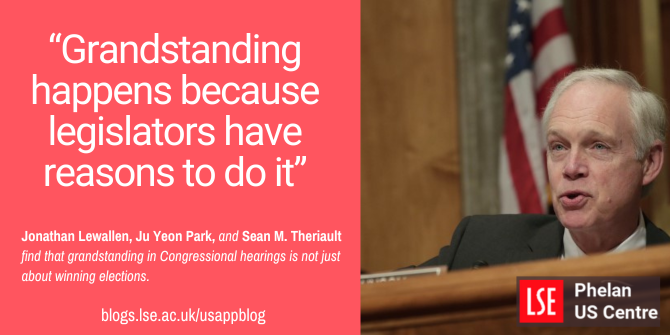

 Politicians’ grandstanding during Congressional hearings often sparks scorn from the media and other legislators. In new research, Jonathan Lewallen, Ju Yeon Park, and Sean M. Theriault find that political incentives mean that Congressional hearings on problems are more likely to see grandstanding than those covering solutions or implementation. They suggest that media coverage can encourage grandstanding, and that hearings related to macroeconomics, social welfare, education, and civil rights tend to see more grandstanding as well, especially from legislators in the Minority party.
Politicians’ grandstanding during Congressional hearings often sparks scorn from the media and other legislators. In new research, Jonathan Lewallen, Ju Yeon Park, and Sean M. Theriault find that political incentives mean that Congressional hearings on problems are more likely to see grandstanding than those covering solutions or implementation. They suggest that media coverage can encourage grandstanding, and that hearings related to macroeconomics, social welfare, education, and civil rights tend to see more grandstanding as well, especially from legislators in the Minority party.
On January 31, several technology company CEOs testified at a Senate Judiciary Committee hearing on social media and children’s privacy and exploitation. Much of the media coverage of the hearing focused on “grandstanding”: senators using their time to make statements or create dramatic scenes rather than ask substantive questions. Republican Lindsey Graham of South Carolina, for example, told Meta CEO Mark Zuckerberg he had “blood on [his] hands.” Fellow Republicans Tom Cotton of Arkansas and Josh Hawley of Missouri questioned TikTok CEO Shou Chew about his citizenship status and his country’s connections to China.
While the media and other observers may expect grandstanding in congressional hearings, we also could have expected it to happen given the kind of hearing it was. Even though some senators used their time to advocate for specific bills, the hearing itself was focused on the problem of child privacy and exploitation rather than trying to learn about the potential consequences of one proposed solution. In new research we find evidence that the average member of Congress grandstands more in hearings that focus on a policy problem rather than a specific solution.
Incentives for Congressional grandstanding
When we make any decision—from which policy to support to what to eat for lunch—our brains try to simplify the decision in different ways depending on whether we’re thinking about the problem itself (“I’m hungry and want to eat something”) or a potential solution (“the falafel place three blocks from my office”). In public policy this means we have both problems in search of a solution but also solutions in search of a problem. When focused on understanding problems, policymakers typically take in a wide range of views. When trying to understand proposed solutions, policymakers engage in “expert search” that focuses their attention on the potential consequences of a specific proposal.
We believe the different ways policymakers search for information and make decisions about problems or solutions create different political incentives for participating in committee hearings. Dr. Ju Yeon Park has created measures of congressional grandstanding based on whether they ask substantive questions or make political statements when they interact with hearing witnesses. We calculated legislators’ grandstanding scores in a sample of congressional hearings from 1997 to 2016. We then separated the hearings into three different categories: those focused only on new or emerging problems, without specific proposals attached; hearings focused on proposed alternatives like bills or agency regulations; and hearings that address implementation of existing policies.
We found that problem-oriented hearings exhibit higher grandstanding scores on average than hearings devoted either to proposed alternatives or policy implementation. Problem-oriented hearings have grandstanding scores about 0.65 points higher on average than solution-focused hearings, and about 1.4 points higher than implementation hearings. Increased grandstanding scores for problem-oriented hearings reflect legislators’ desire to distinguish themselves from each other in the public’s view and to highlight their messaging to gain an electoral advantage.
What can be done about grandstanding?
If we don’t like grandstanding, what can be done about it? In addition to the difference between problem- and solution-focused hearings, we offer three factors that incentivize grandstanding in congressional hearings.
First, a lack of opportunities to legislate. The congressional legislative agenda today largely is set by the majority party and majority leaders. Even if they don’t always get everything they want, party leaders have taken on more authority to decide whether to make policy and how for many issues. Minority party legislators often have fewer opportunities to advance their own legislation. Even in the Senate, where individual senators have more power to shape the decisions that get made, much of that power has been ceded to party leaders and senators’ opportunities to offer amendments during floor debate have dwindled. We and Dr. Park find evidence that minority party legislators tend to have higher grandstanding scores. In the recent Senate hearing with tech CEOs, the instances of grandstanding that received the most media attention came from minority-party Republicans.

“191113-H-NI589-092” by U.S. Customs and Border Protection is United States government work
Second, the media environment surrounding Congress encourages grandstanding. As we’ve noted here, much of the news coverage of the January 31 Senate hearing focused on Senator Graham’s “blood on your hands” comment, Senator Cotton’s line of questioning about Chew’s citizenship, and other instances of grandstanding like senators asking the CEOs to apologize to the families present at the hearing. Members of Congress respond to their media environment. Dr. Linda Fowler of Dartmouth University, for instance, has found that Senate oversight of defense and foreign policy changed as media coverage shifted away from the consequences of foreign policy decisions towards covering these issues as instances of interbranch conflict. If we want members of Congress to grandstand less in committee hearings, the substantive questions that do get asked need to receive more coverage.
Third, we find variation in grandstanding depending on the issue being dealt with in a hearing. We find that many of the issues that tend to divide the two parties—macroeconomics, social welfare, education, and civil rights—tend to have relatively high levels of grandstanding scores compared to other issues. Put another way, we see more grandstanding when the two parties try to define problems in different ways to present voters with clear, distinct choices. Not every partisan issue sees more grandstanding, however. We did not find significantly higher levels of grandstanding for issues like labor and immigration. And the January 31 hearing with tech CEOs may be atypical, since we found that hearings related to science and technology had the lowest average grandstanding scores in our data. The political dynamics of technology policy may be changing, though, particularly as questions of content moderation, speech, and algorithmic recommendations on social media sites become more prominent.
Grandstanding in congressional hearings may draw scorn from media observers and even fellow legislators, and ridicule from late night talk show hosts. But grandstanding happens because legislators have reasons to do it, such as expected electoral gains, as Dr. Park’s study finds. Without changes to the legislative and media environment, and without a focus on specific proposals, our research suggests we should expect grandstanding to continue.
- This article is based on the paper, ‘The politics of problems versus solutions: Policymaking and grandstanding in congressional hearings’ in Policy Studies Journal.
- Please read our comments policy before commenting.
- Note: This article gives the views of the author, and not the position of USAPP – American Politics and Policy, nor the London School of Economics.
- Shortened URL for this post: https://wp.me/p3I2YF-dBj






